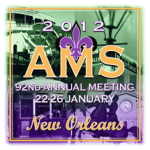Biology
WKU students present research at national meteorology conference
- Friday, February 3rd, 2012
WKU Geography and Geology students Mitchell Gaines, Kyle Mattingly and Lee Campbell attended the 92nd American Meteorological Society Annual Meeting Jan. 22-26 in New Orleans.
 The central theme of the 2012 AMS Annual Meeting was technology and its impact on research, operations, environmental science and the public. Recent advancements in environmental awareness and knowledge have greatly lowered human suffering and loss of life in the United States and around the world from the effects of extreme weather and ecological disaster.
The central theme of the 2012 AMS Annual Meeting was technology and its impact on research, operations, environmental science and the public. Recent advancements in environmental awareness and knowledge have greatly lowered human suffering and loss of life in the United States and around the world from the effects of extreme weather and ecological disaster.
New Orleans, which has lived through Hurricane Katrina and Deepwater Horizon’s oil spill, was an appropriate location for the conference. The meeting focused on past, current and future scientific advances that are of value to AMS members, as well as focusing on “Technology in Research and Operations—How We Got Here and Where We’re Going.”
Geoscience graduate student Mitchell Gaines of Versailles presented a poster on his thesis topic “An Analysis of WRF Physics Parameterization Scheme Combinations for the January 29 and 30th, 2008, Ohio Valley Squall Line Event.” In his abstract, Gaines noted “a squall line of thunderstorms moved through the Ohio Valley with over 300 reports of severe weather. As a result, the need for public awareness increases making accurate forecasting of such events important. Modeling is a key component to any forecast. This study examines the performance of several parameterization scheme combinations in the Weather Research and Forecasting Model with regards to this event.” Read more at http://ams.confex.com/ams/92Annual/webprogram/Paper194284.html
Meteorology major Kyle Mattingly of Owensboro presented a poster, based on his Honors College thesis, titled “Characteristics of Warm-Season Persistent Elongated Convective Systems in Subtropical South America.” In his abstract, Mattingly noted: “Subtropical South America is prone to experiencing some of the largest and most intense thunderstorm complexes in the world. These large thunderstorm complexes, known as mesoscale convective systems (MCSs), are capable of producing severe weather such as heavy rainfall, damaging winds, and large hail and account for a substantial portion of the region’s annual precipitation totals. This study investigates the properties of persistent elongated convective systems (PECS), a class of MCSs that are identical to more commonly-studied Mesoscale Convective Complexes (MCCs) except they are not quasi-circular, in subtropical South America (SSA) during the warm seasons of 1998-2007.” Read more at http://ams.confex.com/ams/92Annual/webprogram/Paper203736.html
Meteorology major Lee Campbell of Paducah presented a paper on “A Synoptic Overview of the Historic 2010 Mid-South Flood” that addresses the devastating flood that impacted the Greater Nashville metro area and Bowling Green on May 1-2, 2010. The strong storms and intense rainfall resulted in 26 fatalities, more than $2 billion in private property damage and more than 11,000 structures affected across the region. In his abstract, Campbell noted: “What makes the 2010 event unique is that the magnitude and quasi-stationary nature of the synoptic pattern was such that a continuous fetch of water vapor from the tropical Pacific ITCZ (Intertropical Convergence Zone) supplied numerous, long-lasting MCSs (mesoscale convective systems) with training cells, which resulted in widespread record rainfall totals.” Read more at http://ams.confex.com/ams/92Annual/webprogram/Paper198791.html
Also attending the conference from WKU were:
- Dr. Josh Durkee, assistant professor of Geography, who presented “A Precipitation Climatology for the Green River Watershed in Kentucky During 1979-2010” with colleagues from the University of Georgia.
- Dr. Xingang Fan, assistant professor of Geography, who presented “Drought and Wetness Conditions in USA From a High Resolution Downscaled Climate.”
- Professor Rezaul Mahmood, associate director of the Kentucky Mesonet and the Kentucky Climate Center, presented “Kentucky Mesonet: An Overview and Update.”
Contact: David Keeling, (270) 745-4555.
Some of the links on this page may require additional software to view.

